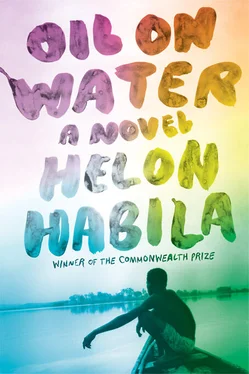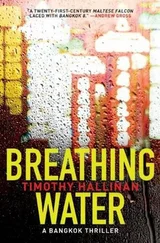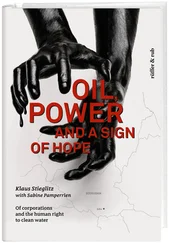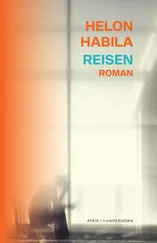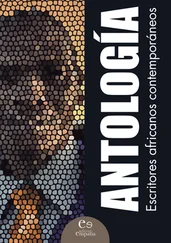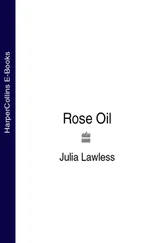It is the first time I’ve seen him in the flesh.
The Chairman tells us, Go and write an essay each on today’s top headlines. And we, What exactly should we write? And he, It doesn’t matter, just remember this: keep to the point, stay close to home. The farther from home you wander, the closer you get to Siberia. Always remember that.
The girl is the first to drop out. She says she has an offer elsewhere, a fashion magazine, and really she can’t waste her days sitting in some anteroom trying to figure out silly riddles about Siberia. Before she goes, she calls me outside and says, You’re wasting your time. The boy is from the same village as the editor. He’ll get the job. It’s all arranged. I thank her and return to the anteroom, where Tekena and I continue to sit, not next to each other as before, united, but facing across from each other, adversarially, and when I get tired of his cocky, knowing smile I stand up, go to the toilet and call the number Zaq gave me at Bar Beach. And he answers.
— I need your help, Mr. Zaq.
In the end both Max and I are hired. But from the beginning it is clear that I’m not in the same league as Max Tekena. He is a natural, and before the end of our probation period he has a front-page story. The editor walks him round the newsroom, from table to table, the cover in his hand, praising him, and at my corner he stops and says, Young man, you will accompany Max here on local assignments, but as a photographer. Your CV, if it is all true, says you have done some photography. Well, work with him, and you might learn a few things.
I didn’t hate Max Tekena. He turned out to be my only friend in the newsroom; at lunch we always sat together and talked about girls and soccer and movies. I’d have hated him if he were just the editor’s kinsman, but he was also talented. He had it, that instinct only a real journalist has, the ability to almost effortlessly predict what story is going to grow, and to follow it relentlessly to its logical conclusion. Maybe that was why he died early. He had gone with six other reporters deep into the forest to interview five foreign hostages taken from their offices, in broad daylight, by masked gunmen. The kidnappers, eager for publicity, would usually invite a select team of reporters to their hideout to confirm that the hostages were alive and unharmed, after which they would make long speeches about the environment and their reasons for taking up arms against the oil companies and the government, and finally they’d send a ransom demand through one of the reporters. After a week or so, depending on how quickly negotiations went, the oil companies paid up and the hostages were set free, unharmed, each with his bagful of anecdotes. But this time things didn’t work out quite so smoothly. One of the hostages, a desperate Filipino contractor, perhaps doubtful of ever regaining freedom, had suddenly bolted and attempted to get away in one of the speedboats waiting to take the reporters back to Port Harcourt, but he didn’t get far. The militants, in black overalls, their faces covered in masks made of green leaves, fired wildly, and afterward three men lay dead on the pebbly beach. One was the Filipino; the other two were the reporters Max Tekena and Peter Olisah.
AND SO, UNDERSTANDABLY, this time the invitation to interview a hostage hung unanswered in front of the editor’s office. The editor took down the notice, shaking his head regretfully.
— I don’t blame you guys for holding back, but I hate to see other papers outscoop us. The event is tomorrow, and already three reporters have signed up, from the Globe , the Voice and the Daily Star .
He laughed. His voice grew derisive. — Guess who from the Star ? Zaq.
I was standing with the other reporters in the little passage between the editor’s office and the newsroom, listening, avoiding the editor’s eyes, but when I heard Zaq’s name I stepped forward.
— I’ll go.
The editor opened his mouth to laugh, but when he saw I was serious, the laugh turned to a sneer.
— Well, well, the little photographer wants to be a real reporter, eh? Well, come into my office and tell me what you have in mind.
The editor sat facing me, his paunch almost resting on the desktop, his expression switching between contempt and a frown. On his left sat the news editor; on his right, the deputy editor.
— Well, talk.
I stammered. I hesitated. I mumbled. I told them I’d write it not as a kidnapping story only, but I’d try to find out what kind of woman the hostage was: if she had children, if she regretted coming to Nigeria, if she had any message for her husband. Things like that. The three men waited to hear more, but I fell silent.
— Is that all?
I could see the editor was trying hard not to snigger.
— Well, sir, there is also the effect on the international price of oil.
— Aren’t you afraid of the danger? You could get killed.
— I see it as a great opportunity to show what I can do, sir.
I didn’t tell them that, though I wasn’t sure exactly what to look for, I was confident that with Zaq there everything would work out fine. He’d be my guide, my teacher. Once, when he was drunk and helpless, I had looked after him; now it was his turn to look after me. Fate, it seemed, had brought us together.
The Major sat on a field stool, the type made by unfolding the topof a swagger stick, his rifle on the muddy ground by his foot, talking into a radio. Seven men knelt facing him under the trees in the central clearing, their hands tied behind them, all wearing the same abject expression on their faces. They looked dirty, their skin was flaky and reptilian, chalk-white, as if they had been dragged through an acreage of ash. Behind the seven, but not very far away from them, were Tamuno and Michael, squatting on their haunches, looking perplexed and anxious.
The Major stood up and pointed at the kneeling men with his swagger stick, shaking his head to show his disappointment in them. He hadn’t looked in my direction yet. The boy started crying and held his father tight when the Major went over to them and stared down at them for a long time without saying a word. Then he came over to me.
— So, you are the journalist. Where’s the other one?
He turned to his men when he asked the question, not waiting for my answer. Two of them stood behind me, their guns vaguely pointed at me. A soldier had found me in the Doctor’s shed in a chair next to Zaq’s narrow cot, my eyes closed, my ears waiting for the slightest sound from Zaq. He had kicked me in the shin to wake me up, and even in the gloom of the shed I could see his glare.
— You, come! Both of you. Now. The Major wan see you. Now. Oya.
I stood up and almost fell down again. I wasn’t aware of how tired and disoriented I was. I swayed like a height-drunk alpinist, halfway through his climb, unsure if he was ever going to get to the top, and not really sure if he cared anymore.
— He can’t come. He’s sick.
— Well, you come.
The Doctor was seated behind his desk, writing on a piece of paper. He didn’t look up as the man led me out into the dying day. Now I watched the Major walk up and down in front of us, his tall legs stretching out fully beneath his oddly foreshortened torso, as if measuring the ground, and finally he stopped in front of me and looked me full in the face.
— Do you know what danger you run, two journalists, an old fisherman and his son, running about in these waters? How old is the boy?
The boy, seeing the Major staring at him and now walking toward him, took his father’s arm again, burying his face in the old man’s shoulder. The old man looked up at the Major, a rictuslike smile on his face.
Читать дальше
